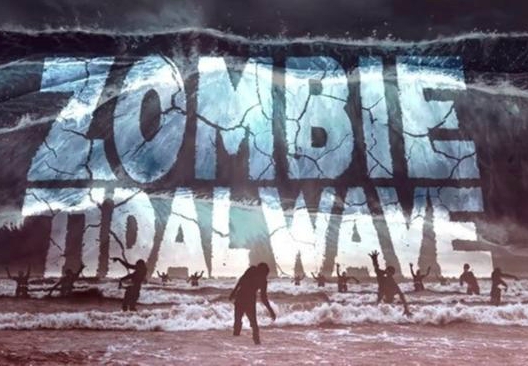I watched Zombie Tidal Wave this weekend fully expecting to hate on it. The sleepy reception of Jim Jarmusch’s The Dead Don’t Die has struck the point home that zombie films are real life dead; not to mention, as of last year, Sharknado season is officially over. So, this late-cycle cash grab as only asylum studio can give us felt cringe in a bad way. Judging by the trailer, I really thought we were in for Zombienado or Sharknado 7: Zombie Boogaloo.
But… man. Zombie Tidal Wave is good, y’all. It’s real good.
Zombie Tidal Wave manages to recapture everything that made Sharknado so special. Action! A moody atmosphere! Snarky comedy! Smart dialogue! Serviceable acting! A cast that you’ll love to get to know! And most important of all, Ian Ziering with a hunch of weapons, taking a goofy premise way too seriously. And dammit, I believed him. I was with him one-hundred percent. It’s no surprise as Zombie Tidal Wave reunites Ziering (who is credited with writing this time around) with Sharknado franchise overlord, Anthony C. Ferrante.
Okay, so the special effects aren’t the greatest and the zombie make-up could use some work. But none of that really stopped me from having a good time, you know? If you like picking up on obscure references in your flicks, there is an entire sequence that pays homage to Romero’s Diary of the Dead of all things. And I loved it.
But, I want to pay a special shout out to Ferrante and Ziering for cribbing from Romero and Fulci’s environmentalist tendencies—as seen in the aforementioned Diary and, in Fulci’s case, Zombi 2—in the best ways by injecting a subtle and really timely message in a zombie flick. The horror of the tsunami of zombies here rests not with Mad Science Run Amok, but with Actually Really Horrifying Science exploiting an indigenous community’s vulnerability. The bio-weapon experimentation that created the zombies revealed during the course of the film has rendered the coastal dependent and silent in the face of heinous human experimentation. Sound outlandish? No, the intersections of science, access to healthcare, and the effects of isolation on indigenous groups is science fact. I mean, it wouldn’t be the first time that science has preyed upon people of color. It’s something you can see in real time today with the lack of access to healthcare for folks of color, knowing that our bodies serve as testing grounds for side effects, medications, and so on. And no one cares until there’s… a massive zombie outbreak from the sea.
Okay, maybe that part is a little weird. For a more external example, you may have heard of Native Hawaiians recently protesting the invasion of sacred spaces for a large telescope. The legacy of colonialism is casually deciding that advancing the goals of the dominant class must come at the cost of marginalized groups. It’s really fascinating that such a small-scale movie would even go there. Zombie films, historically, have been used to make big statements about society so it isn’t terribly surprising. But even Romero had a hard time hitting issues on the nose at times, and here the implicit racism is just made explicit.
I wouldn’t blame you for thinking it’s an exploitative play or a fluke, but Zombie Tidal Wave drives its point home by actually giving us sympathetic heroes of color (specifically black and Asian, which statistically almost never happens) who don’t exist solely to sacrifice themselves so that A White Man may live. Seriously, the cast of this low-budget disasterpiece has more non-white actors per capita than your best summer feature not named the farewell. Zombies, soft science, an intellectual plot, and actual diversity in casting? Your move, Hollywood. (Undead) surf’s up.

